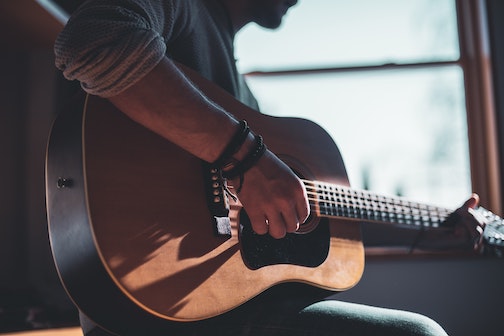
Let There Be Rest
WRITTEN BY:
Rob Maroney
March 22, 2023
When I was 12 years old my family moved across town to a new neighborhood. My new next door neighbor played guitar, and I got hooked. We would ride the bus for almost an hour to the largest music store downtown just to drool over, dream, and play the expensive guitars. We would stay for hours.
My neighbor and I started playing guitar when we were 12 years old, I had my first rock and roll band when I was 16, and I have played for over 50 years. My wife is also a musician. She studied music in college, became a vocalist, and also a guitar player. All three of our children are musicians, and each one more proficient than me. But I still love music, and even though my hands don’t cooperate like they used to due to age and arthritis, I still have a pretty good ear for pitch, tone, and timing.
Timing is obviously one of the most important parts of music. Voices and instruments always come to a place in the music where they are supposed to stop playing … they rest. At these well-placed moments, it’s just as important to not play, even though it feels like you aren’t contributing anything, and yet it becomes such an important part of the overall score. When it’s your time to rest in the score, and you stop playing, the rest continues to be an important part of the music being played.
Like the way we use punctuation in language, music is separated, and structured, by these important, well-placed rests. In order for the music to make sense, rests are critically important and intelligently placed by the composer. But even during the rests, the song is not over … it’s just a time to wait … the music goes on. But the rest must be taken at the right time, by the right players, and for the right duration.
How do I know when to rest?
I’m learning more about the importance of rest these days. For many years, work was my default setting. I would anxiously get caught up in the demands of the day and the hectic pace of life, and I can still be pulled back into this unhealthy pattern. However, as I continue my journey of understanding the importance of rest in my life, I’m learning to constantly trust the conductor and keep my eyes on Him. Even when I’m not sure what’s next, I have to trust that God literally “knows the score” and He sees the beginning from the end.
But when I fail to pay attention to the need for rest, I make a mess of the music, and the rhythm of life can become chaotic and disjointed. When my body tells me it’s time to slow down, that’s a signal I need to rest. When my emotional well-being is off balance and I become irritable, impatient, or unkind, I know I need to rest.
Why do we rest?
Rest has a purpose, and God told us to rest for a purpose.
“Remember the sabbath day and keep it holy. Six days you shall labor and do all your work. But the seventh day is a sabbath to the Lord your God; you shall not do any work.” – Exodus 20:9-10
Bulgarian essayist, Maria Popova describes rest in this way: “Rest, instead of being something passive, is actually an act of resistance.” It’s an act of resistance against the tyranny of the urgent. It’s an act of resistance to the constant demands that are placed on all of us. Rest is saying I’m going to take some time for myself so that I can be better prepared to handle life that is in front of me. Rest directly opposes systems of anxiety, which define value in production and busyness. I’m learning that rest is not always a passive state.
But notice … the conductor never stops. Even when one or more instruments are resting, and resting at different times, the conductor is always at work, always moving through the score, with purpose and intent. Pay attention to the conductor … and know when to rest.




